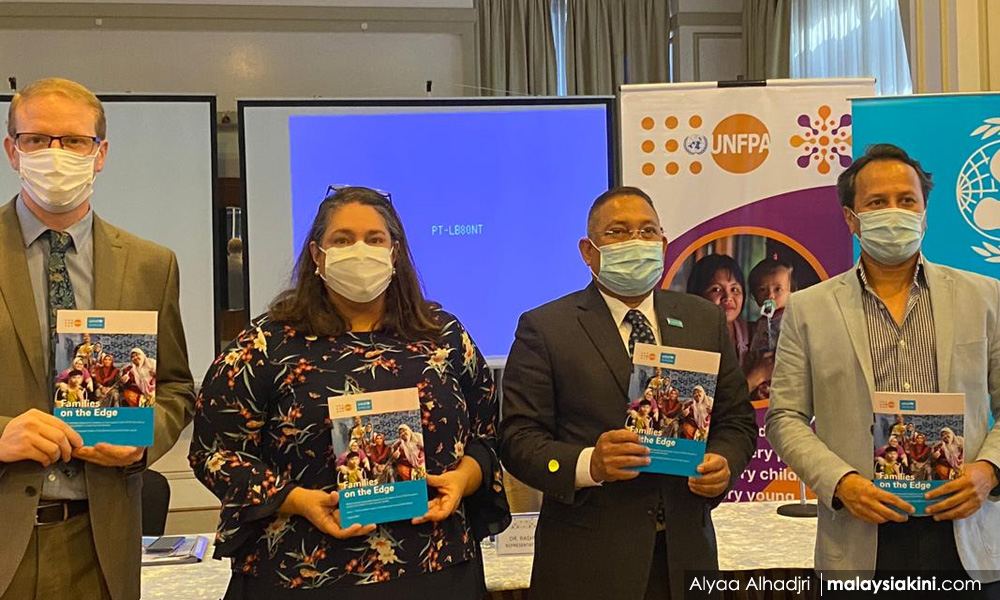
COVID-19 | Urban poor dwellers of Peoples Housing Project (PPR) schemes reported increased consumption of eggs and rice during the movement control order (MCO) period, a finding described by two United Nations agencies as an indication of poor nutrition made worse by the Covid-19 crisis.
The study, jointly commissioned by Unicef and the United Nations Populations Fund (UNFPA), aimed to fill a particular gap in the evidence on the impact of Covid-19 on women and children in low-income Malaysian families.
In presenting early findings of the "Families on Edge" study, DM Analytics managing director Muhammed Abdul Khalid said respondents of the study conducted among 500 urban poor households cited eggs as being one of the cheapest available protein sources.
Of the figure, 20 percent of the surveyed households were headed by women. Women also comprise the majority of 24 percent single-parent households among the 500 families.
With barely any savings and disrupted income, Muhammed said these families in 16 PPR schemes, particularly in the lowest income group of less than RM2,000 a month, also cited the increase in consumption of eggs and instant noodles, as opposed to rice or other produce.
"The problem (of malnutrition) is compounded as the children were not going to school and so they are not receiving any additional assistance from the government's supplementary food plan," he said.
Aside from interviews with the head of households, Muhammed said the study also provided their children with smartphones to capture realities of life under MCO - from their daily routines, adjusting to online studying and meals shared during the period.
The result showed evidence of inadequate meals, at times comprising only canned food or the cheapest available alternatives.
In terms of savings, Muhammed said the study found that among the female head of households, only five in 100 have enough savings to last them more than three months.
Overall, he noted that while government assistance through immediate cash handouts had benefited the families, respondents also reported such measures will not sustain them in the long run.
"That is not what they want. They want sustainable help, in particular, they want jobs.
"They are very proud people, responsible people, rational people," he said in addressing the perception of an over-reliance to government aid among the lower-income communities.

UNFPA Malaysia representative Marcela Suazo said findings released today will provide an initial insight into the situation of families living in urban low-cost flats in Malaysia.
"The report highlights the particular plight of women and children in female-headed households, which appear to be badly affected by the Covid-19 crisis."
Speaking to reporters after the report's launch, Unicef Malaysia's chief of social policy, Stephen Barrett, said that measures undertaken by the government could determine the future of children growing up during this current global health crisis.
"As households are coming out of the MCO, there is a high risk of children not going back to school," Barrett said, citing the impact of economic setbacks on low-income families.
For those restarting school, he noted that children from low-income families were also less likely to have engaged in home learning, placing them at a disadvantage among their peers.
Summary findings of the study stated that female-headed households have been shown to be exceptionally vulnerable, with higher rates of unemployment and lower rates of access to social protection.
Children in these households also appear to be particularly vulnerable to long-term negative impacts, as evidenced by higher rates of challenges in accessing effective e-learning during the most intense period of the crisis.
Unicef Malaysia country representative Rashed Mustafa Sarwar, in his opening address, credited the government for ongoing efforts to mitigate the impact of the pandemic.
"The government has been bold and innovative in its policy-making into the recovery phase, and this must continue.
"This is an opportunity to build back better. We have a chance to rethink public policy support for child and family wellbeing," said Rashed.
The six-month study will continue to look into immediate socio-economic impacts of Covid-19 on the 500 families and its results will be released in future reports under the Unicef-UNFPA "Families on the Edge" project. - Mkini



No comments:
Post a Comment
Note: Only a member of this blog may post a comment.